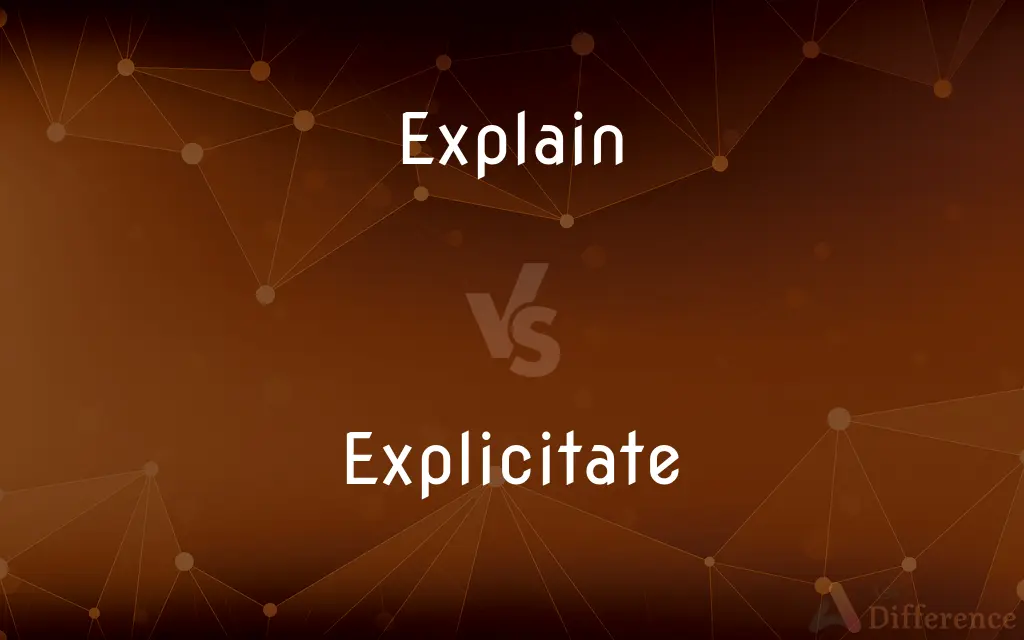Explain vs. Explicitate — What's the Difference?
Edited by Tayyaba Rehman — By Urooj Arif — Updated on March 19, 2024
Explain involves clarifying or making something understandable, by providing details or revealing relevant information. Explicitate specifically refers to making something explicit or detailed, usually by unfolding implications of what is already known.

Difference Between Explain and Explicitate
Table of Contents
ADVERTISEMENT
Key Differences
Explain typically refers to the process of making something clear or understandable, often by describing it in more detail or revealing pertinent information. It's commonly used in various contexts, from educational settings to everyday conversations, where the goal is to convey understanding or clarity about a subject, idea, or process. Explicitate, on the other hand, is a more specialized term that focuses on making something explicit or detailed. It involves elaborating or expanding on something to make its implicit aspects fully explicit. This process might include unfolding the implications or underlying assumptions of a statement, theory, or concept, thereby providing a more in-depth or comprehensive explanation.
In educational contexts, explain is widely used to refer to the process of helping students understand a concept, principle, or problem-solving method. This might involve breaking down complex ideas into simpler parts, using analogies, or providing examples. The emphasis is on transferring knowledge in a way that makes it accessible and understandable to the learner. Explicitate, while less common in everyday language, might be used in academic or technical writing to denote a thorough detailing of concepts, theories, or models. This could involve dissecting a theory to lay bare its foundational assumptions, thereby offering a deeper level of understanding or insight into the subject matter.
Explain can be seen as a more general and widely applicable term, suitable for a broad range of contexts where the goal is to make something clear or understandable. It encompasses various methods of clarification, from simple descriptions to complex analyses, depending on the nature of what is being explained and the audience's level of understanding. Explicitate, with its focus on making the implicit explicit, implies a more focused and perhaps more detailed approach to explanation. It suggests not just a surface-level clarification but a deep dive into the nuances and underlying aspects of a subject, making it particularly useful in contexts where a high degree of specificity and detail is required.
Comparison Chart
Definition
Making something understandable by providing details or context.
Making something explicit or detailed, often by elaborating on implications.
Common Usage
Broadly used in various contexts to convey understanding.
Less common, typically used in academic or technical contexts.
ADVERTISEMENT
Focus
General clarity or understanding.
Detailed explication or unfolding of implicit aspects.
Examples
Explaining a scientific concept, a historical event, or how to perform a task.
Explicitating the assumptions of a theory or the nuances of a complex idea.
Suitability
Suitable for a wide audience and various levels of detail.
More suited for specialized discussions or in-depth analysis.
Compare with Definitions
Explain
To make understandable.
The teacher explained the concept of photosynthesis in simple terms.
Explicitate
To clarify by expanding.
The author explicitated the theme through various character arcs.
Explain
To justify or rationalize.
He explained his late arrival as being due to traffic.
Explicitate
To make explicit or clear.
The philosopher explicitated the underlying assumptions of the argument.
Explain
To describe or elucidate.
The manual explains how to assemble the furniture.
Explicitate
To detail or elaborate upon.
The report explicitates the steps taken during the research.
Explain
To provide information or instruction.
The guide explained the significance of each historical site.
Explicitate
To unfold or reveal implications.
The study explicitates the potential consequences of climate change.
Explain
To clarify by giving an example.
She explained the idea by drawing a diagram.
Explicitate
To specify or enumerate in detail.
The policy document explicitates the criteria for eligibility.
Explain
Make (an idea or situation) clear to someone by describing it in more detail or revealing relevant facts
He explained the situation
‘It's a device of great age,’ the professor explained
They explained that their lives centred on the religious rituals
Explicitate
(transitive) To explain meticulously or in great detail.
Explain
To make plain or comprehensible.
Explain
To define; expound
We explained our plan to the committee.
Explain
To offer reasons for or a cause of; justify
Explain an error.
Explain
To offer reasons for the actions, beliefs, or remarks of (oneself).
Explain
To make something plain or comprehensible
Let me explain.
Explain
To make plain, manifest, or intelligible; to clear of obscurity; to illustrate the meaning of.
She is about to explain a chapter of the Bible to the Sunday School students.
She tried to explain but he wouldn’t listen.
Explain
To give a valid excuse for past behavior.
Explain
(obsolete) To make flat, smooth out.
Explain
(obsolete) To unfold or make visible.
Explain
(intransitive) To make something plain or intelligible.
Explain
To flatten; to spread out; to unfold; to expand.
The horse-chestnut is . . . ready to explain its leaf.
Explain
To make plain, manifest, or intelligible; to clear of obscurity; to expound; to unfold and illustrate the meaning of; as, to explain a chapter of the Bible.
Commentators to explain the difficult passages to you.
Explain
To give an explanation.
Explain
Make palin and comprehensible;
He explained the laws of physics to his students
Explain
Define;
The committe explained their plan for fund-raising to the Dean
Explain
Serve as a reason or cause or justification of;
Your need to sleep late does not excuse your late arrival at work
Her recent divorce amy explain her reluctance to date again
Common Curiosities
Can explain and explicitate be used interchangeably?
While there is some overlap, explicitate is more specialized and focuses on detailing or unfolding implications, making it less interchangeable with explain.
What does it mean to explain something?
Explaining involves making something clear or understandable, often by providing additional details or context.
Does explaining always involve simplification?
Explaining often involves breaking down complex ideas, but it can also include providing in-depth analysis depending on the audience's needs.
How does explicitate differ from explain?
Explicitate specifically involves making something explicit or detailed, particularly by elaborating on its implicit aspects.
Is explicitate a common term in everyday language?
No, explicitate is less common and more often used in academic or technical contexts.
Do all explanations require examples?
Not necessarily, but examples can be a powerful tool to aid understanding.
Is explaining a skill?
Yes, it's a valuable skill that involves the ability to convey information clearly and effectively.
Can something be explained without being made explicit?
Yes, explaining can involve clarifying something without delving into all its detailed implications.
Does explaining presuppose misunderstanding?
Not always; it can also serve to expand knowledge or provide new perspectives.
Is explicitating always more detailed than explaining?
Typically, yes, as explicitating involves a detailed unfolding of implicit aspects.
Can explicitate be used in casual conversation?
It's less common, but it can be used when a detailed or specific clarification is necessary.
Is it possible to explicitate without prior knowledge?
Explicitating usually requires a good understanding of the subject to detail its implicit aspects.
Can one explicitate ideas in all fields?
In theory, yes, but it's more common in fields with complex theories or models.
How does context affect explaining and explicitating?
The audience's background, the complexity of the topic, and the setting can greatly influence how and when these methods are used.
Can explicitation lead to more questions?
Yes, as delving into details can uncover more layers of complexity.
Share Your Discovery

Previous Comparison
Prevail vs. Win
Next Comparison
Hereof vs. ThereofAuthor Spotlight
Written by
Urooj ArifUrooj is a skilled content writer at Ask Difference, known for her exceptional ability to simplify complex topics into engaging and informative content. With a passion for research and a flair for clear, concise writing, she consistently delivers articles that resonate with our diverse audience.
Edited by
Tayyaba RehmanTayyaba Rehman is a distinguished writer, currently serving as a primary contributor to askdifference.com. As a researcher in semantics and etymology, Tayyaba's passion for the complexity of languages and their distinctions has found a perfect home on the platform. Tayyaba delves into the intricacies of language, distinguishing between commonly confused words and phrases, thereby providing clarity for readers worldwide.













































